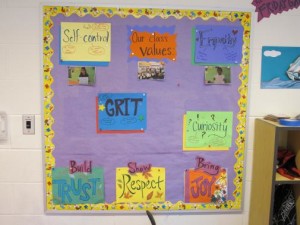 Every week, Detroit Future Schools (DFS) artist-in-residence Joe Rodriguez-Tanner works with the students at Amelia Earhart in Southwest Detroit, integrating digital media arts into their core content. He works in close partnership with their teacher, Anna Marschalk-Burns (known to the students as Ms. MB) who is committed to fostering in her students the DFS "11 Essential Traits of Habit, Character and Mind."
Allied Media Projects Co-Director Jenny Lee recently sat in during Joe's work in Ms. MB's class and shares her observations here:
Every week, Detroit Future Schools (DFS) artist-in-residence Joe Rodriguez-Tanner works with the students at Amelia Earhart in Southwest Detroit, integrating digital media arts into their core content. He works in close partnership with their teacher, Anna Marschalk-Burns (known to the students as Ms. MB) who is committed to fostering in her students the DFS "11 Essential Traits of Habit, Character and Mind."
Allied Media Projects Co-Director Jenny Lee recently sat in during Joe's work in Ms. MB's class and shares her observations here:
Ms. MB and Joe have established a classroom culture in which students co-create knowledge, take responsibility for their own actions and investigate profound questions together. The students are in second grade.
Last week I observed a lesson on curiosity. Curiosity is one of the DFS 11 Essential Traits and it is also one of the class’s five core values. The previous week’s lesson had been about another core value, self-control.
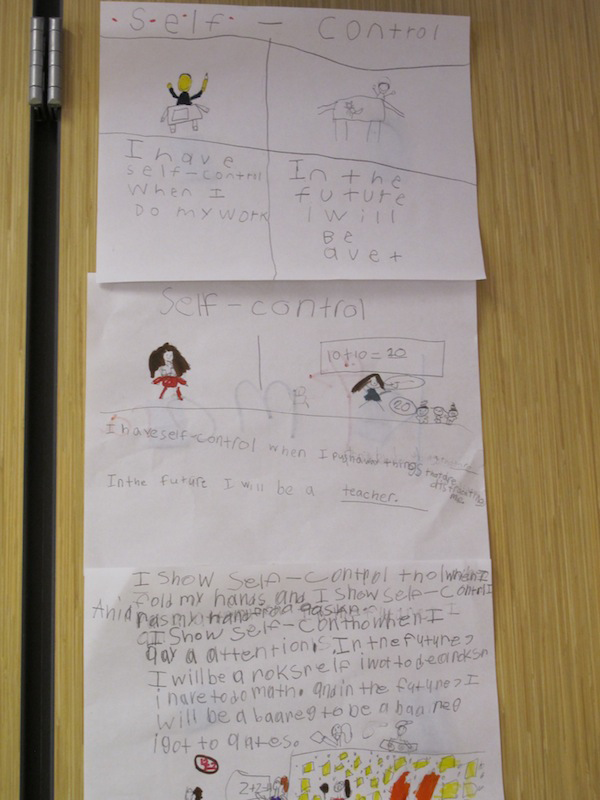 Mr. Joe, as he is known to the students, began the class by asking students to recap what they learned the previous week and to brainstorm what the definition of curiosity was. Students chattered their thoughts in response to these questions until Ms. MB said "I'm noticing a lot of side-talking. You know what to do if you have something to say." She makes the gesture of covering her mouth with one hand while raising the other one. This hand signal is one part of an elaborate system of active listening practices that Ms. MB has built into her classroom. Students helped develop some of the hand signals and regularly use them with each other, effectively distributing classroom management to the students themselves.
Mr. Joe, as he is known to the students, began the class by asking students to recap what they learned the previous week and to brainstorm what the definition of curiosity was. Students chattered their thoughts in response to these questions until Ms. MB said "I'm noticing a lot of side-talking. You know what to do if you have something to say." She makes the gesture of covering her mouth with one hand while raising the other one. This hand signal is one part of an elaborate system of active listening practices that Ms. MB has built into her classroom. Students helped develop some of the hand signals and regularly use them with each other, effectively distributing classroom management to the students themselves.
A student raises their hand and when Mr. Joe calls on her she says, "sometimes I just have so much curiosity that I don’t have self-control." This moment of metacognition, or "thinking about your thinking," reveals the success of the classroom culture that Ms. MB has created, with the help of Mr. Joe. Second grade students are grappling with the contradiction between curiosity and self-control by analyzing their own behaviors.
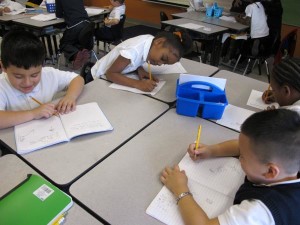 This happened again later in the lesson, when two students pulled out a book and started reading together, while a third was trying to convey a point to the whole class. A fourth student intervened to ask why the two had started reading a book, rather than paying attention to their fellow classmate. One of them explained honestly, "he was taking too long to talk and I got bored so I took out my book." The other added, "I was curious about what she was reading, and wanted to read too." Mr. Joe thanked the students for their explanations and used the scenario to return to the point, that self-control and curiosity can sometimes work at odds with each other, even though they are both positive things.
This happened again later in the lesson, when two students pulled out a book and started reading together, while a third was trying to convey a point to the whole class. A fourth student intervened to ask why the two had started reading a book, rather than paying attention to their fellow classmate. One of them explained honestly, "he was taking too long to talk and I got bored so I took out my book." The other added, "I was curious about what she was reading, and wanted to read too." Mr. Joe thanked the students for their explanations and used the scenario to return to the point, that self-control and curiosity can sometimes work at odds with each other, even though they are both positive things.
The lesson continued, as Mr. Joe showed clips from a Sesame Street episode about the musical narrative, "Peter and the Wolf," pausing it whenever students saw indicators of curiosity. The episodes features a conversation with an orchestra conductor about how the sounds of different instruments help tell the story. Mr. Joe discussed with the class how different instruments could actually play the parts of different characters in a story. He then asked, "What does curiosity sound like?"
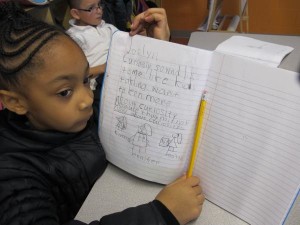 As a college-educated, full-grown adult observer of this classroom, I puzzled over the question, struggling to come up with an answer and trying to imagine how second graders would be able to answer this question. Meanwhile, the students wrote or drew their answers eagerly in their journals. When the time came to share their work, each table of students was tasked with deciding who at their table should present first. They negotiated this for a while, saying things like, "Deven went first last time, so he shouldn’t go first this time" or "Khaliyah hasn’t spoken much today, maybe she should go." Noticeably, the students who had the biggest personalities exercised their leadership by directing these conversations, rather than vying for the chance to go first.
As a college-educated, full-grown adult observer of this classroom, I puzzled over the question, struggling to come up with an answer and trying to imagine how second graders would be able to answer this question. Meanwhile, the students wrote or drew their answers eagerly in their journals. When the time came to share their work, each table of students was tasked with deciding who at their table should present first. They negotiated this for a while, saying things like, "Deven went first last time, so he shouldn’t go first this time" or "Khaliyah hasn’t spoken much today, maybe she should go." Noticeably, the students who had the biggest personalities exercised their leadership by directing these conversations, rather than vying for the chance to go first.
As I walked around to look at the students' work, I was blown away by some of their answers. One student had drawn a picture of a person with their hand raised and exclamation marks coming out of their mouth. He explained to me, "curiosity sounds like 'ooh! ooh! ooh!'." Another student had written in her journal, "curiosity sounds like a student asking their teacher what curiosity means, because they might not know what it means." Another had written, "sometimes curiosity sounds quiet, because you’re thinking."
In the car on the way back to the Allied Media Projects office, Mr. Joe explained that this is all leading up to a project in which the students will create their own audio collage, using sounds to tell stories. The day’s activities had been building their skills towards that project, while seamlessly integrating character-building and core content (in this case, writing was the core content). Every day DFS teachers and artists learn new ways of reaching this sweet-spot, where we begin to redefine the purpose and practice of education. My observation at Earhart offers a small window into this world of transformative education that is emerging in classrooms across the city.
 We are excited to invite all teachers to apply for one of the most transformative and effective professional development opportunities of a lifetime.
Detroit Future Schools (DFS) needs innovative, passionate, committed teachers toapply. Applications will be accepted on a rolling basis. The first round of applications will be reviewed in April 2013.
We are excited to invite all teachers to apply for one of the most transformative and effective professional development opportunities of a lifetime.
Detroit Future Schools (DFS) needs innovative, passionate, committed teachers toapply. Applications will be accepted on a rolling basis. The first round of applications will be reviewed in April 2013.

 Every week,
Every week,  Mr. Joe, as he is known to the students, began the class by asking students to recap what they learned the previous week and to brainstorm what the definition of curiosity was. Students chattered their thoughts in response to these questions until Ms. MB said "I'm noticing a lot of side-talking. You know what to do if you have something to say." She makes the gesture of covering her mouth with one hand while raising the other one. This hand signal is one part of an elaborate system of active listening practices that Ms. MB has built into her classroom. Students helped develop some of the hand signals and regularly use them with each other, effectively distributing classroom management to the students themselves.
Mr. Joe, as he is known to the students, began the class by asking students to recap what they learned the previous week and to brainstorm what the definition of curiosity was. Students chattered their thoughts in response to these questions until Ms. MB said "I'm noticing a lot of side-talking. You know what to do if you have something to say." She makes the gesture of covering her mouth with one hand while raising the other one. This hand signal is one part of an elaborate system of active listening practices that Ms. MB has built into her classroom. Students helped develop some of the hand signals and regularly use them with each other, effectively distributing classroom management to the students themselves. This happened again later in the lesson, when two students pulled out a book and started reading together, while a third was trying to convey a point to the whole class. A fourth student intervened to ask why the two had started reading a book, rather than paying attention to their fellow classmate. One of them explained honestly, "he was taking too long to talk and I got bored so I took out my book." The other added, "I was curious about what she was reading, and wanted to read too." Mr. Joe thanked the students for their explanations and used the scenario to return to the point, that self-control and curiosity can sometimes work at odds with each other, even though they are both positive things.
This happened again later in the lesson, when two students pulled out a book and started reading together, while a third was trying to convey a point to the whole class. A fourth student intervened to ask why the two had started reading a book, rather than paying attention to their fellow classmate. One of them explained honestly, "he was taking too long to talk and I got bored so I took out my book." The other added, "I was curious about what she was reading, and wanted to read too." Mr. Joe thanked the students for their explanations and used the scenario to return to the point, that self-control and curiosity can sometimes work at odds with each other, even though they are both positive things. As a college-educated, full-grown adult observer of this classroom, I puzzled over the question, struggling to come up with an answer and trying to imagine how second graders would be able to answer this question. Meanwhile, the students wrote or drew their answers eagerly in their journals. When the time came to share their work, each table of students was tasked with deciding who at their table should present first. They negotiated this for a while, saying things like, "Deven went first last time, so he shouldn’t go first this time" or "Khaliyah hasn’t spoken much today, maybe she should go." Noticeably, the students who had the biggest personalities exercised their leadership by directing these conversations, rather than vying for the chance to go first.
As a college-educated, full-grown adult observer of this classroom, I puzzled over the question, struggling to come up with an answer and trying to imagine how second graders would be able to answer this question. Meanwhile, the students wrote or drew their answers eagerly in their journals. When the time came to share their work, each table of students was tasked with deciding who at their table should present first. They negotiated this for a while, saying things like, "Deven went first last time, so he shouldn’t go first this time" or "Khaliyah hasn’t spoken much today, maybe she should go." Noticeably, the students who had the biggest personalities exercised their leadership by directing these conversations, rather than vying for the chance to go first.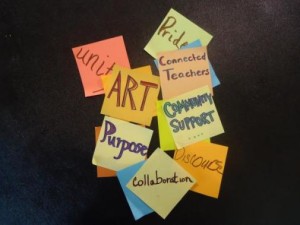 Allied Media Projects is searching for an academic researcher or journalist interested in studying the impact of our innovative digital media arts-integration program,
Allied Media Projects is searching for an academic researcher or journalist interested in studying the impact of our innovative digital media arts-integration program,